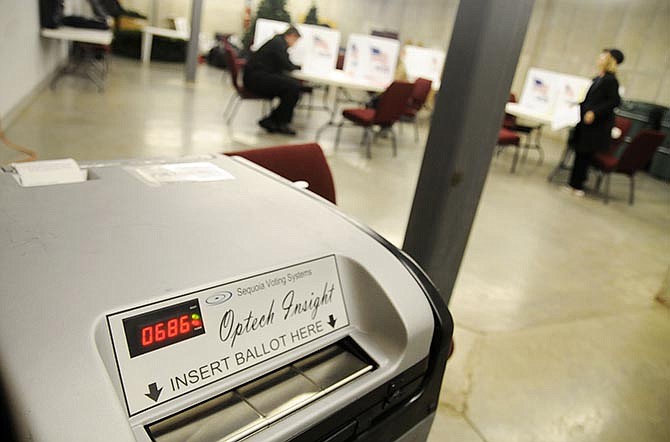Correction: This story was modified at 3:15 p.m. Thursday, 12/31/2015, to correct the identification of the Libertarian Party --- which had been incorrectly identified in the original version.
In just 76 days, Missouri voters can have a say in who should be the political parties' candidates to be the next U.S. president.
Filing for Missouri's March 15 presidential preference primary ended Tuesday with a total of 26 candidates on the ballot - nine Democrats, 12 Republicans and five Libertarians.
Four years ago, the primary was held in February, but it largely was a "beauty contest" because the Republican and Democratic parties used caucuses to choose their national convention delegates. That decision came after both national parties said states holding primaries earlier than March would lose half their delegates.
Missouri has had a presidential primary since 2000, and lawmakers in 2002 moved it from the first Tuesday in March to February, so the state could have more influence on choosing the national parties' candidates.
But that put Missouri ahead of other traditional "early" states in the presidential sweepstakes, and the two major national party officials wanted to restore that balance. Thus, the request to move the Missouri primary back to after March 6 - or have less influence at the national convention.
Lawmakers passed a bill in 2011 moving the 2012 primary to March - a change Gov. Jay Nixon supported. But he vetoed the bill because lawmakers eliminated local elections in the state's smaller municipalities "when the number of candidates is equal to the number of positions to be filled," and they ordered special elections to complete the current term of a U.S. senator or statewide elected official if that office became vacant.
In his veto message, Nixon said the proposed municipal elections change eliminated voters' opportunity to choose a write-in candidate.
Current law requires the governor to fill a statewide vacancy - as Nixon did earlier this year, when he named John Watson, then Nicole Galloway to replace state Auditor Tom Schweich, who committed suicide in February.
In his veto message of the 2011 bill, Nixon said requiring a special election would cost taxpayers about $7 million for the statewide election.
Lawmakers didn't override the veto, leaving taxpayers on the hook for paying about $7 million for the statewide presidential primary with no impact.
As with any other primary election in Missouri, voters next March will be able to choose only one party's ballot.
The filing began Dec. 1, and a lottery determined the ballot positions for all candidates filing the first day. After that, the candidates' names were placed on the ballot in the order they filed for it with the secretary of state's office.
Despite national attention to the presidential race, several of the candidates on the Missouri ballot have not been well-publicized to this point.
• In the order their names will appear on the ballot, the Democrat candidates are Hillary Clinton, Henry Hewes, Rocky De La Fuente, Bernie Sanders, Keith Judd, Willie L. Wilson, Martin J. O'Malley, John Wolfe and Jon Adams.
• The Republicans on the ballot are, in order, Chris Christie, Jeb Bush, Ben Carson, Donald J. Trump, Marco Rubio, Ted Cruz, Rick Santorum, Carly Fiorina, John R. Kasich, Rand Paul, Jim Lynch and Mike Huckabee.
• The five Libertarian Party candidates are Austin Petersen, Steven Elliott (Steve) Kerbel, Rhett Rosenquest Smith, Cecil Ince and Marc Allan Feldman.
Leonard Steinman of Jefferson City has announced plans to run for president - as an independent candidate - so his name won't appear on the March 15 ballot, which only is for candidates from specific political parties.
By the time the Nov. 8 general election happens, others may have added their names to the list of independents who want to challenge the established party candidates.
A complete list of the filed candidates, along with their mailing addresses and when they filed, is available on the secretary of state's website at www.sos.mo.gov.
Filing for the Aug. 2 primary and Nov. 8 general elections begins at 8 a.m. Feb. 23 and ends at 5 p.m. March 29.

